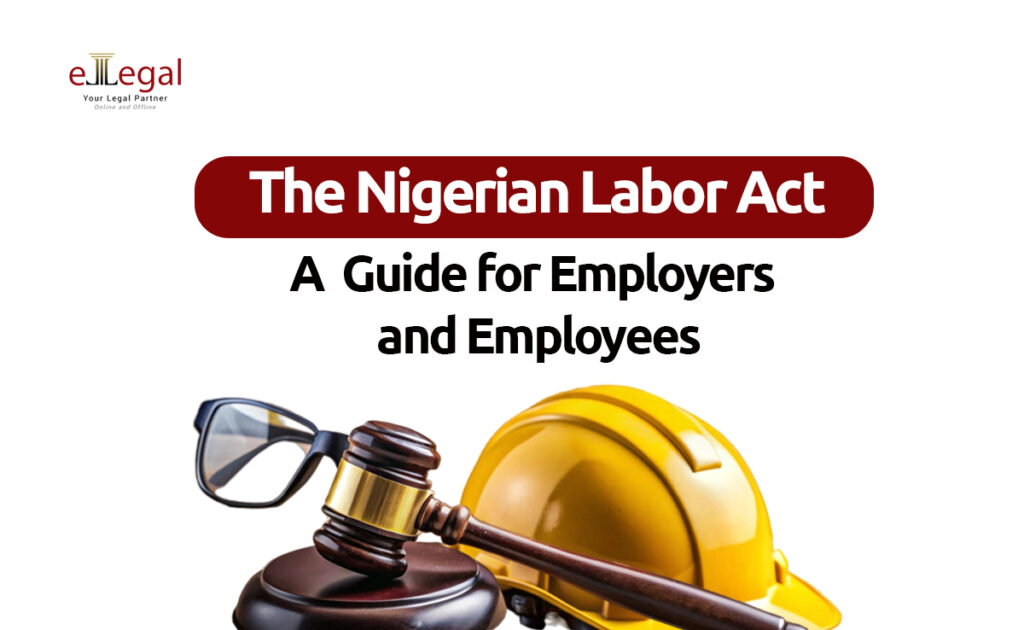As is common in all human pursuits, every job or profession is accompanied by risks that expose workers to potentially unpleasant situations. Depending on the industry, these risks may arise within the confines of the workplace or in external situations, occurring during employment.
The Nigerian Labor Act serves as a fundamental legal framework that regulates employment relationships within Nigeria. It was enacted to establish guidelines for equitable employment practices, detailing the rights and obligations of employers and employees alike.
Familiarity with this Act is essential for both parties to guarantee adherence to legal standards, safeguard their rights, and promote a constructive workplace atmosphere.
Background to The Nigerian Labor Act
The Nigerian Labor Act 2004, is designed to oversee employment practices and labor relations in Nigeria. Its fundamental purpose is to ensure that employees are treated fairly while clarifying the responsibilities of employers. The Act addresses a broad spectrum of employment-related issues, including contracts, working conditions, salary, and termination protocols. It is applicable to all employees in Nigeria, except for those holding managerial and supervisory positions, as well as public sector workers.
Employment Contracts
Section 7 of the Labor Act houses the provisions related to the basis of any employment relationship. It requires that employers furnish employees with a written contract of employment within three months of the employment’s initiation. The act also provides punishment for employers who don’t comply.
Sadly, the application of this provision is not being effectively implemented in Nigeria, as there are frequent occurrences where employers intentionally delay or refuse to provide employment contracts. This strategy is employed to escape the fundamental legal responsibilities that pertain to their employees.
Despite the evident neglect of this provision of the Labor Act in Nigeria, there is a striking deficiency of reported cases that involve enforcement actions due to the refusal to issue employment contracts. This issue may be closely related to the widespread ignorance among employees regarding their rights under the existing Labour laws.
Working Hours
As outlined in Section 7 (1) (g) of the Labour Act, the employment contract is required to contain information pertaining to the hours of work for the employee. The act further states in Section 13 that the hours of work are to be;
a. Mutually agreed by the parties
b. Fixed by collective bargaining within the organization or industry concerned; or
c. by an industrial wages board (established by or under an enactment providing for the establishment of such boards) where there is no machinery for collective bargaining
It is important to highlight that a significant challenge confronting employees in Nigeria is the exploitation of working hours by employers, which occurs regardless of any mutual agreement established in the employment contract. Additionally, there is a concerning trend of incorporating unpaid overtime into these contracts without proper disclosure.
Leave & Holiday
Section 18(1) of the Labor Act stipulates that every employee is entitled to a minimum of six working days of holiday, whereas individuals under 16 years of age are entitled to at least twelve working days. However, this provision is not compulsory, as section 18(2) permits the deferment of the leave period if both the employee and employer reach an agreement.
The existing framework of the Labor Act is detrimental to employees, as those who work uninterrupted for twelve months without any time off are at a heightened risk of experiencing significant health problems.
Section 16 addresses the provisions related to sick leave, stipulating that an employee is entitled to receive their wages for a maximum of 12 working days within a single calendar year when they are absent from work due to a temporary illness.
Health and Safety
Employers are required to provide a safe working environment. This includes proper facilities, equipment, and safety measures to prevent occupational hazards. The Act mandates that employers must address health and safety issues promptly and ensure that employees have access to necessary medical care.
Therefore, when an employee is injured at work due to the employer’s neglect or inability to maintain reasonable safety standards, the employer must pay damages to the injured party for the resulting harm. However, it is worthy of note to know that the act does not impose a stiff punishment for employers that contravene the provisions of the act. Consequently, the critical question arises: what remedies exist for the employee who has experienced injury as a result of a dangerous workplace?
Despite the enforcement of occupational health and safety legislation in Nigeria, full compliance remains elusive. The sanctions prescribed in the Act fail to act as a meaningful deterrent to wrongdoers, rendering the legal process ineffective and trivial.
In Nigeria, the prevalence of unhealthy and unsafe working conditions is a significant concern, impacting various sectors beyond just factories, including both formal and informal employment. The Nigerian government and its agencies have a responsibility to cease the exploitation of its citizens and to uphold their fundamental human rights as guaranteed by the 1999 Constitution.
There is a critical need for ongoing evaluations of work environments that are linked to severe infringements on employees’ rights to health and safety.
Redundancy and Severance
The Nigerian Labor Act, of 2004, provides a regulatory framework for various employment issues, including redundancy. Redundancy occurs when an employer reduces their workforce due to economic or operational reasons, making certain positions unnecessary.
Nonetheless, the Labour Act does not outline a specific procedure for employers to implement in cases of redundancy or for calculating severance benefits. According to Section 20 (2) of the Act, the Minister of Works and Labor is tasked with creating general regulations concerning redundancy payments.
However, there is no documentation to suggest that the Minister has formulated any regulations that would oversee or offer direction on the redundancy process and the computation of redundancy sums in Nigeria, by the requirements of Section 20 (2) of the Labor Act.
Dispute Resolution
In Nigeria, the exclusive jurisdiction over labor and employment relations, trade unions, and workplace-related issues, including employee conditions of service, health, safety, and welfare, is vested solely in the National Industrial Court of Nigeria (NICN), thereby excluding all other courts from these matters.
The National Industrial Court Civil Procedure Rules 2017 specify the procedural guidelines to be adhered to in proceedings before the NICN.
Additionally, these Rules provide for Alternative Dispute Resolution, allowing judges to refer disputes to the Alternative Dispute Resolution Centre for resolution through mediation or conciliation, which must be finalized within 21 days of commencement, with a permissible extension of no more than 10 working days. If the parties are unable to reach a settlement, the case will then be taken to court.
Notice Periods for Termination
In compliance with the provisions of the act, the party wishing to terminate the contract of employment must give adequate notice to the other party. The Labor Act specifies the required notice periods in Section 11, which are as follows; one day for contracts lasting three months or less; one week for contracts exceeding three months but less than two years; two weeks for contracts lasting between two and five years; and one month for contracts that have been in effect for five years or more.
Salary & Wages
The salary or wages that an employer must pay is generally included as a specific term in the contract of employment. Nevertheless, if the agreement fails to mention payment, it could raise questions about whether a valid employment contract exists. In Nigeria, the specifics of payment of wages is regulated by the National Minimum Wage Act, 2019 which stipulates the minimum amount that every employer must pay to its employees. The act further states that any contract of employment that doesn’t comply with the above is void.
Conclusion
Understanding the Nigerian Labor Act is essential for both employers and employees to navigate the complexities of employment relationships effectively. Employers must ensure compliance with the Act to avoid legal disputes and foster a positive work environment.
Employees, on the other hand, should be aware of their rights and responsibilities to protect themselves and contribute to a fair and productive workplace.
You can reach out to us at eLegal Consultants, we have a team of qualified legal consultants that can properly guide you if you find yourself amid any Labor or employment issue. Contact us today




